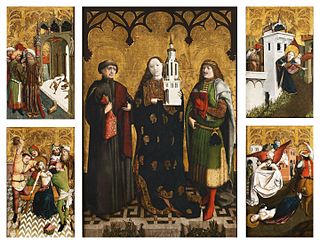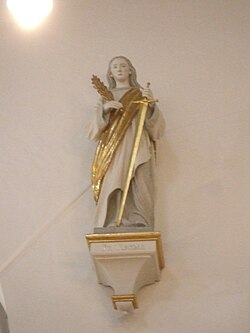
Agnes of Rome is a virgin martyr, venerated as a saint in the Catholic Church, Oriental Orthodox Church and the Eastern Orthodox Church, as well as the Anglican Communion and Lutheran Churches. She is one of several virgin martyrs commemorated by name in the Canon of the Mass, and one of many Christians martyred during the reign of the Roman emperor Diocletian.

Catherine of Alexandria, also spelled Katherine is, according to tradition, a Christian saint and virgin, who was martyred in the early 4th century at the hands of the emperor Maxentius. According to her hagiography, she was both a princess and a noted scholar who became a Christian around age 14, converted hundreds of people to Christianity, and was martyred around age 18. More than 1,100 years after Catherine's martyrdom, Joan of Arc identified her as one of the saints who appeared to and counselled her.

According to apocrypha, as well as Christian and Islamic tradition, Saint Anne was the mother of Mary, the wife of Joachim and the maternal grandmother of Jesus. Mary's mother is not named in the Bible's canonical gospels. In writing, Anne's name and that of her husband Joachim come only from New Testament apocrypha, of which the Gospel of James seems to be the earliest that mentions them. The mother of Mary is mentioned but not named in the Quran.

Lucia of Syracuse (283–304AD), also called Saint Lucia was a Roman Christian martyr who died during the Diocletianic Persecution. She is venerated as a saint in Catholic, Anglican, and Eastern Orthodox Christianity. She is one of eight women explicitly commemorated by Catholics in the Canon of the Mass. Her traditional feast day, known in Europe as Saint Lucy's Day, is observed by Western Christians on 13 December. Lucia of Syracuse was honored in the Middle Ages and remained a well-known saint in early modern England. She is one of the best known virgin martyrs, along with Agatha of Sicily, Agnes of Rome, Cecilia of Rome, and Catherine of Alexandria.

Queen of Heaven is a title given by Christians to Mary, mother of Jesus, mainly in the Catholic Church and Eastern Orthodoxy, and, to a lesser extent, in Anglicanism and Lutheranism. The title has long been a tradition, included in prayers and devotional literature and seen in Western art in the subject of the Coronation of the Virgin from the High Middle Ages, long before the Church gave it a formal definition status.

Agathaof Sicily is a Christian saint. Her feast is on 5 February. Agatha was born in Catania, part of the Roman Province of Sicily, and was martyred c. 251. She is one of several virgin martyrs who are commemorated by name in the Canon of the Mass.

Flavigny-sur-Ozerain is a commune in the French department of Côte-d'Or, in Bourgogne-Franche-Comté.

Radegund was a Thuringian princess and Frankish queen, who founded the Abbey of the Holy Cross at Poitiers. She is the patroness saint of several churches in France and England and of Jesus College, Cambridge.

Thecla was a saint of the early Christian Church, and a reported follower of Paul the Apostle. The earliest record of her life comes from the ancient apocryphal Acts of Paul and Thecla.

Flavigny Abbey is a former Benedictine monastery, now occupied by a little handcraft and family factory [today, the TROUBAT family for tree génération), in Flavigny-sur-Ozerain, Côte-d'Or département, France. The monks at this abbey were the original makers of the well-known aniseed confectionery Anise de Flavigny.

Alise-Sainte-Reine is a commune in the Côte-d'Or department in the Bourgogne-Franche-Comté region of eastern France.

Saint Praxedes, called "a Roman maiden", was a saint and virgin who lived in the Roman Empire during the 2nd century. Along with her sister, Saint Pudentiana, she provided for the poor and gave care and comfort to persecuted Christians and martyrs. Her veneration began in the 4th century and many churches have been dedicated to her.

Symphorian, Timotheus (Timothy), and Hippolytus of Rome are three Christian martyrs who, though they were unrelated and were killed in different places and at different times, shared a common feast day in the General Roman Calendar from at least the 1568 Tridentine calendar to the Mysterii Paschalis. While still a young man, Symphorian was either beheaded or beaten to death with clubs.

Devota is the patron saint of Corsica and Monaco. She was killed during the persecutions of the Roman Emperors Diocletian and Maximian. She is sometimes identified with another Corsican saint named Julia, who was described in Latin as Deo devota. The description was misinterpreted as a proper name. The legend connected with her is similar to those told of other saints of the region, such as Reparata and Torpes of Pisa.
Sainte-Reine may refer to:

Ephigenia of Ethiopia or Iphigenia of Ethiopia, also called Iphigenia of Abyssinia, is a Western folk saint whose life is told in the Golden Legend as a virgin converted to Christianity and then consecrated to God by Matthew the Apostle, who was spreading the Gospel to the region of "Ethiopia," which in this case is understood to be located in the regions south of the Caspian Sea, either in one of the provinces of Mesopotamia, or in Ancient Armenia (Colchis).

The title Virgin is an honorific bestowed on female saints and blesseds, primarily used in the Eastern Orthodox Church and the Catholic Church.

Christina of Tyre, also known as Christine of Bolsena, or in the Eastern Orthodox Church as Christina the Great martyr, is venerated as a virgin martyr of the third century. Archaeological excavations of an underground cemetery constructed over her tomb have shown that she was venerated at Tyre by the fourth century.

Dorothea of Caesarea is a 4th-century virgin martyr who was executed at Caesarea Mazaca. Evidence for her actual historical existence or acta is very sparse. She is called a martyr of the late Diocletianic Persecution, although her death occurred after the resignation of Diocletian himself.

Saint Barbara, known in the Eastern Orthodox Church as the Great Martyr Barbara, was an early Christian Greek saint and martyr. There is no reference to her in the authentic early Christian writings nor in the original recension of Saint Jerome's martyrology.



















